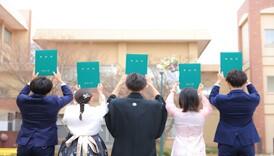お知らせ
- HOME
- ニュース&イベント一覧
- 【国際交流PRアソシエイトからの発信★】Graduation Ceremony ...
【国際交流PRアソシエイトからの発信★】Graduation Ceremony 卒業式
掲載日2024.3.27
ニュース
2024年3月22日に岩手大学は卒業生及び修了式を開催しました。
さて、日本の大学の卒業式とはどんな感じでしょう。卒業生は何を着ていくのでしょうか。タイ人留学生のRittさんがご紹介します。
(言語:英語・タイ語)
Iwate University held its graduation ceremony on March 22, 2024. What is a graduation ceremony at a Japanese university like? What do graduates wear? Ritt, a Thai international student, will tell you about it.
(Language: English and Thai)
Graduation Ceremony (卒業式)
In Japan, graduation ceremonies typically take place in March, where students receive their diplomas in the main auditorium of their school or in rented venues. At Iwate University, the March graduation ceremony is held at the Tosai Classic Hall in the Iwate Prefectural Civic Center, while the September ceremony takes place at the historical museum of agricultural education within the university grounds. This year's Iwate University graduation ceremony occurred on Friday, March 22, 2024.
Graduation ceremonies hold immense cultural significance, deeply rooted in tradition. They mark not only academic milestones but also symbolize the transition to adulthood and the next stage of life for students as they reach the pinnacle of their learning journey.
A notable aspect of graduation ceremonies in Japan is the attire worn by graduates. Female students typically wear traditional Japanese clothing known as "hakama" for formal events. Hakama consists of wide-legged pants paired with a formal kimono. Male students opt for black or navy blue suits. This traditional attire not only reflects Japan's cultural heritage but also underscores the formality of the occasion. Many of our international student friends also choose to wear their national costumes to represent their pride in this special event.
Ceremonies are meticulously planned and executed with great care. They typically feature speeches by the university president and sometimes guest speakers, all of whom usually emphasize the values of perseverance, hard work, and gratitude. During the ceremony, students will received the certificate individually. It's common for them to shake hands or bow as a gesture of respect towards the presenting teacher, symbolizing the culmination of their hard work and effort over the years. Graduates are celebrated not only for their academic achievements but also for their personal growth and contributions to the school community. It's particularly fitting that the graduation ceremony is held in March, the beginning of spring, symbolizing new beginnings. Graduates, akin to blossoming flowers, are poised to become valuable members of society, ready to make their mark.
Overall, graduation ceremonies in Japan embody an ancient tradition that not only celebrates academic achievement but also personal growth, companionship, and the beginning of a new journey. They are a reminder of the values of perseverance, respect, and gratitude that are deeply treasured in Japanese culture. How about the graduation ceremonies for fellow international students from other countries? How is your country's graduation ceremony similar or different from Japan? However, on this joyful occasion, we would like to take the opportunity to express our congratulations to all new graduates: "Congratulations on your graduation, and we wish you good luck in the future."ご卒業おめでとうございます!
--------
พิธีจบการศึกษา
พิธีสำเร็จการศึกษาที่ญี่ปุ่น มักจะจัดขึ้นในเดือนมีนาคม โดยมีพิธี "มอบประกาศนียบัตร" ในหอประชุมหลักของสถาบันการศึกษา หรือสถาบันการศึกษาบางแห่งจะเช่าหอประชุมเพื่อจัดพิธี สำหรับมหาวิทยาลัยอิวาเตะพิธีจบการศึกษาในเดือนมีนาคม จะจัดขึ้นที่ Tosai Classic Hall, Iwate Prefectural Civic Center ส่วนการสำเร็จการศึกษาในเดือนกันยายนจะจัดขึ้นที่ Historical museum of agricultural education โดยปีนี้พิธีสำเร็จการศึกษาได้จัดขึ้นในวันศุกร์ที่ 22 มีนาคม 2567
พิธีสำเร็จการศึกษานั้นมีรากฐานมาจากประเพณีและมีความสำคัญทางวัฒนธรรมอันยิ่งใหญ่ เมื่อนักเรียนถึงจุดสูงสุดของเส้นทางการเรียนรู้ พิธีการเหล่านี้ไม่ได้เป็นเพียงหมุดหมายสำคัญทางวิชาการเท่านั้น แต่ยังเป็นการเปลี่ยนผ่านไปสู่วัยผู้ใหญ่และก้าวต่อไปของชีวิตอีกด้วย
ลักษณะเด่นประการหนึ่งของพิธีสำเร็จการศึกษาในญี่ปุ่นคือการแต่งกายที่สวมใส่โดยบัณฑิต โดยทั่วไปแล้วนักเรียนหญิงจะสวมเสื้อผ้าญี่ปุ่นแบบดั้งเดิมที่เรียกว่า "ฮากามะ" ในโอกาสที่เป็นทางการ ฮากามะเป็นกางเกงขากว้างประเภทหนึ่งที่จับคู่กับชุดกิโมโนแบบเป็นทางการสำหรับผู้หญิง ส่วนนักเรียนชายจะใส่ชุดสูทสีดำหรือสีกรมท่า เครื่องแต่งกายแบบดั้งเดิมนี้สะท้อนให้เห็นถึงมรดกทางวัฒนธรรมอันยาวนานของญี่ปุ่นและเน้นย้ำถึงความศักดิ์สิทธิ์ของพิธีการนี้ สำหรับเพื่อนนักเรียนชาวต่างชาติหลายๆคน เลือกสวมใส่ชุดประจำชาติ ในโอกาสอันพิเศษนี้ด้วย
พิธีการต่างๆ มีการวางแผนและดำเนินการอย่างพิถีพิถัน มักจะมีการกล่าวสุนทรพจน์โดยอธิการบดี และบางครั้งวิทยากรรับเชิญ สุนทรพจน์เหล่านี้มักเน้นย้ำถึงความสำคัญของความอุตสาหะ การทำงานหนัก และความกตัญญู ในระหว่างพิธีนักเรียนจะได้รับประกาศนียบัตรรายบุคคล พวกเขามักจะจับมือหรือโค้งคำนับเพื่อแสดงความเคารพต่ออาจารย์ผู้นำเสนอ ช่วงเวลานี้เป็นสัญลักษณ์ของการทำงานหนักและความพยายามที่ทุ่มเทตลอดหลายปีที่ผ่านมา บัณฑิตผู้สำเร็จการศึกษาจะได้รับการเฉลิมฉลองไม่เพียงแต่สำหรับความสำเร็จทางวิชาการเท่านั้น แต่ยังรวมถึงการเติบโตส่วนบุคคลและการมีส่วนร่วมในชุมชนอีกด้วย ซึ่งพิธีจบการศึกษาจัดขึ้นในช่วงเดือนมีนาคมนั้น ซึ่งเป็นช่วงเริ่มต้นของฤดูใบไม้ผลิ บัณฑิตที่จบใหม่ จึงเสมือนเป็นดอกไม้ที่เติบโตสุกงอมและกำลังผลิบานพร้อมเข้าเป็นกำลังสำคัญของสังคม
โดยรวมแล้ว พิธีสำเร็จการศึกษาในญี่ปุ่นเป็นประเพณีโบราณที่ไม่เพียงแต่เฉลิมฉลองความสำเร็จทางวิชาการเท่านั้น แต่ยังรวมถึงการเติบโตส่วนบุคคลด้วย ความสนิทสนมกันและการเริ่มต้นการเดินทางครั้งใหม่เช่นกัน สิ่งเหล่านี้เป็นสิ่งเตือนใจถึงคุณค่าของความอุตสาหะ ความเคารพ และความกตัญญูที่ฝังแน่นอย่างลึกซึ้งในวัฒนธรรมญี่ปุ่น แล้วพิธีสำเร็จการศึกษาของเพื่อนนักศึกษาต่างชาติประเทศอื่น ๆ เป็นอย่างไรกันบ้าง มีลักษณะที่คล้าย หรือแตกต่างกันกับที่ญี่ปุ่นมั้ยนะ และเนื่องในโอกาสอันน่ายินดีนี้ขอถือโอกาสกล่าวแสดงความยินดี ถึงบัณฑิตใหม่ทุกคน " ขอแสดงความยินดีด้วยกับการสำเร็จการศึกษา และขอให้โชคดีต่อไปในอนาคต":)
---
Written by: Ritt J. Jirasukprasert
----
#IwateUniversity #Morioka #IwateUniversity #International #GraduationCeremony #Congratulation











